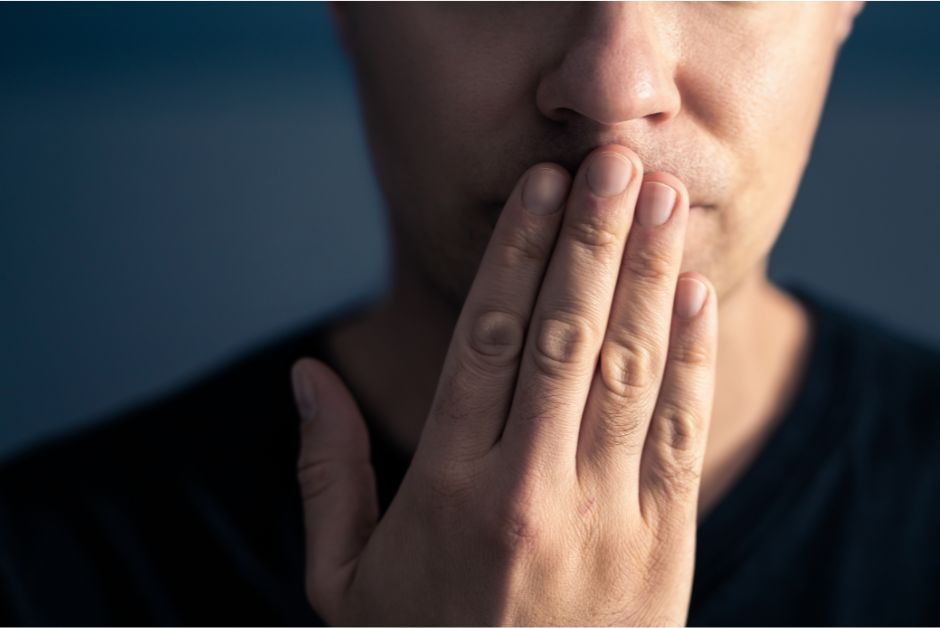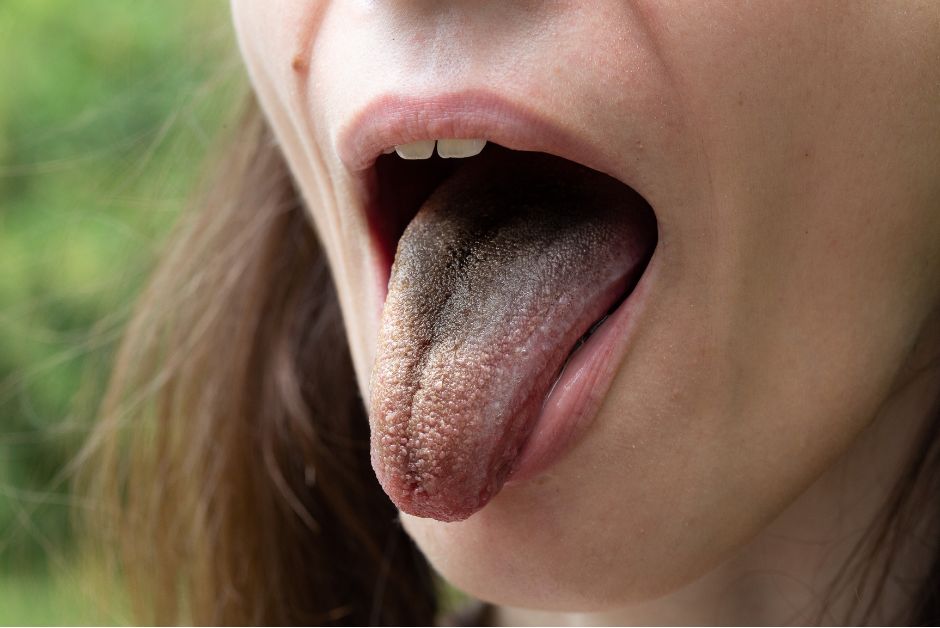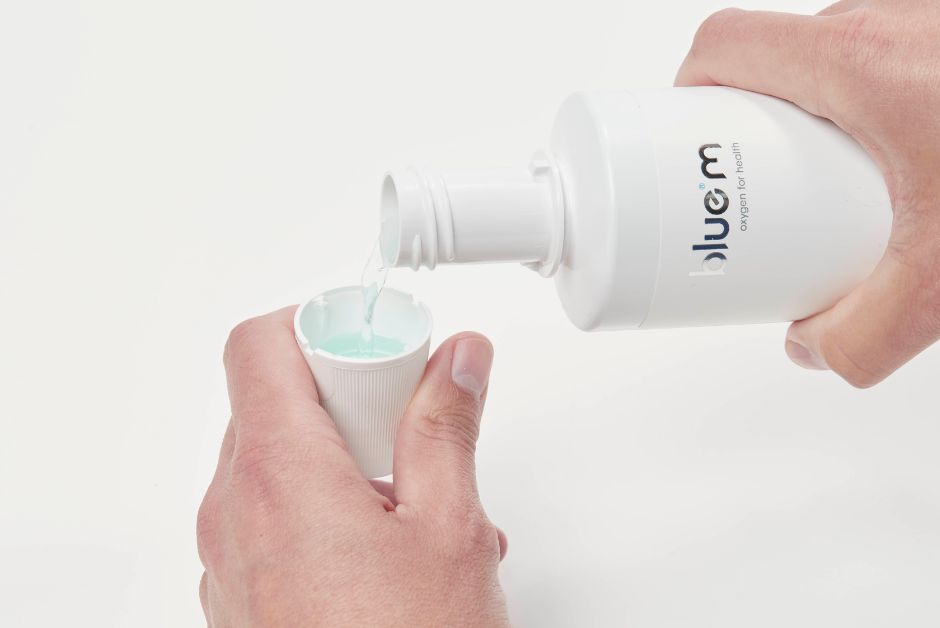

Have you ever noticed an unusual, coated appearance on your tongue?
It might be a condition called hairy tongue – an unpleasant issue that can affect the look, feel, and even smell of your mouth.
Hairy tongue (sometimes referred to as black hairy tongue) is a harmless but sometimes alarming oral condition where the tongue develops a discoloured, fuzzy appearance.
This occurs when the filiform papillae (tiny projections on the surface of the tongue) grow longer instead of shedding as they normally would.
These overgrown papillae trap food, bacteria, and other debris, leading to the characteristic “hairy” look.

The symptoms of hairy tongue can range from mild to more noticeable, depending on the severity of the condition.
While it is generally harmless, it can cause discomfort and affect oral hygiene. Here are the most common symptoms:
The tongue may appear black, brown, white, yellow, or even greenish due to trapped bacteria, food particles, and staining from beverages like coffee and tea.
The tongue develops a rough, hairy, or fuzzy feel caused by the elongation of the filiform papillae, which can trap debris and bacteria.
The build-up of bacteria and food particles in the overgrown papillae can lead to persistent bad breath, even after brushing.
Some people experience a change in taste perception or a lingering metallic or unpleasant taste in the mouth.
In more severe cases, the elongated papillae can trigger a gag reflex, especially when eating or drinking.
A lack of saliva flow can contribute to the accumulation of debris on the tongue, making the condition worse.
While usually painless, some individuals may feel slight irritation or a burning sensation, particularly if certain foods or beverages come into contact with the affected area.

Several factors can contribute to the development of hairy tongue, including:
Infrequent brushing and tongue cleaning can allow debris and bacteria to accumulate.
These substances can stain and promote bacterial growth on the tongue.
A lack of saliva flow can lead to the build-up of dead cells and bacteria.
Antibiotics, which alter the bacterial balance in the mouth, can contribute to this condition.
Some antiseptic rinses can irritate the tongue and contribute to excessive papillae growth.
A lack of rough foods (which naturally scrape the tongue) can slow down the shedding of papillae.

Hairy tongue is usually temporary and can be treated with good oral hygiene and lifestyle adjustments.
Here’s how you can effectively manage and eliminate the condition:
Use a soft-bristled toothbrush or a tongue scraper to gently remove debris and bacteria from the surface of your tongue.
Consistently brushing your teeth and tongue with a fluoride or oxygen-enriched toothpaste helps maintain a clean oral environment.
Alcohol-based mouthwashes can worsen the condition by drying out the mouth.
Instead, opt for oxygen-enriched mouthwash, which helps break down bacteria, supports natural healing, and promotes a healthier tongue.
Drink plenty of water throughout the day to keep your mouth moist and encourage the natural shedding of dead cells from the tongue’s surface.
If you suffer from dry mouth, using a saliva-boosting product or chewing dental gum may help.
Eat more fibrous foods like apples, carrots, and celery, which naturally help to exfoliate the tongue and remove build-up.
Reduce the intake of coffee, tea, and tobacco, which can stain the tongue and contribute to bacterial accumulation.
Certain mouthwashes containing peroxide or alcohol can irritate the tongue and worsen the condition. Switching to a gentler, oxygen-based oral care product like blue®m can help prevent further irritation.
If antibiotics or other medications are contributing to hairy tongue, consult your doctor or dentist to discuss possible alternatives.
If hairy tongue persists despite improved oral care, a dentist may recommend professional cleaning or, in rare cases, trimming of the elongated papillae.
In severe cases, antifungal treatments or prescription medications may be required if an infection is present.

Oxygen-enriched blue®m oral care products are specifically designed to help manage and treat a wide range of oral health conditions, including hairy tongue, effectively. Here’s how:
blue®m’s Toothpaste and Mouthwash contain active oxygen, which helps to break down bacteria and promote a healthier oral environment.
Unlike harsh alcohol-based mouthwashes, blue®m’s products support oral hygiene without causing irritation.
blue®m’s ingredients help maintain moisture in the mouth, reducing dryness and aiding in the natural exfoliation of the tongue.
By eliminating odour-causing bacteria, blue®m helps to freshen breath and restore a cleaner feel to the tongue.
Hairy tongue, while not a serious medical condition, can be bothersome and impact confidence.
By maintaining good oral hygiene and using effective products like our oxygen-enriched mouthwash and toothpaste, you can keep your tongue healthy, clean, and free from unwanted discoloration.
If symptoms persist or worsen, consider consulting a dentist for further guidance.


All orders are handled and dispatched by Swallow Dental Supplies Ltd.
